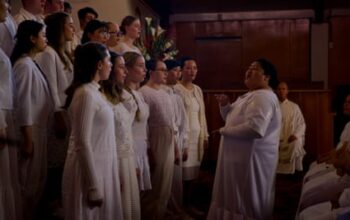
‘This is us! Not a cause!” says Samoan husband-to-be Jason (Nick Afoa) in a rare moment of self-illumination in this soapy and stiflingly well-meaning gay rights drama from New Zealand. But the film is all too focused on pushing its cause: same-sex marriage and greater flexibility of religious thought. In the process, it reduces its characters to flat ciphers and divvies up surrounding society into LGBTQ+ cheerleaders and graffiti-scrawling hate-mongers.
After being in prison, rugby coach Jason gets cosy with widowed vicar Peter (Richard Short). Peter runs an enlightened parish, with a rainbow-emblazoned billboard outside the church, but discovers the limits of tolerance when he declares his intention to marry Jason on the premises. Their nearest and dearest – including Peter’s daughter Kate (Becky McEwan), and Jason’s enigmatic gender-fluid nephew Billy (Joe Malu Folau) – are rooting for them. But with the fire-and-brimstone brigade sharpening their pitchforks, the diocese is willing to use ulterior pressure to keep the peace, including pulling funding for Jason’s youth centre.
Peter’s habit of making momentous announcements concerning his other half on live radio sums up Mysterious Ways’ sloganistic, nuance-light approach. There is no deep interest in how Peter upended his previously conventional life, and why he is so driven as a born-again gay-rights warrior; nor the reasons for Jason’s prickly view of his own sexuality. With such scant personal underpinnings, their struggle is floated on manufactured outrage and cheap assertions. “You’ll become an outcast, a martyr,” the higher-ups warn Peter. “Wasn’t that the role Christ demonstrated so wonderfully?” he replies. (He nearly compares himself to Job later, before someone catches him.) Short’s stiff, enunciating performance doesn’t help – though the film does put him in a pulpit.
The character of Billy, a fa’afafine considered in Samoan culture to be distinct from normal gender categories, is a significant new notch of representation for this rarely depicted population. But Billy is mostly used as doctrinal comic relief to shake up the straight world, and just bolsters the film’s piety without adding any true undercurrents of ambiguity or the unexpected (though he does have an excellent wardrobe). A final, gratuitous revelation about his nature doesn’t make Mysterious Ways any less earthbound.
Source: theguardian.com



